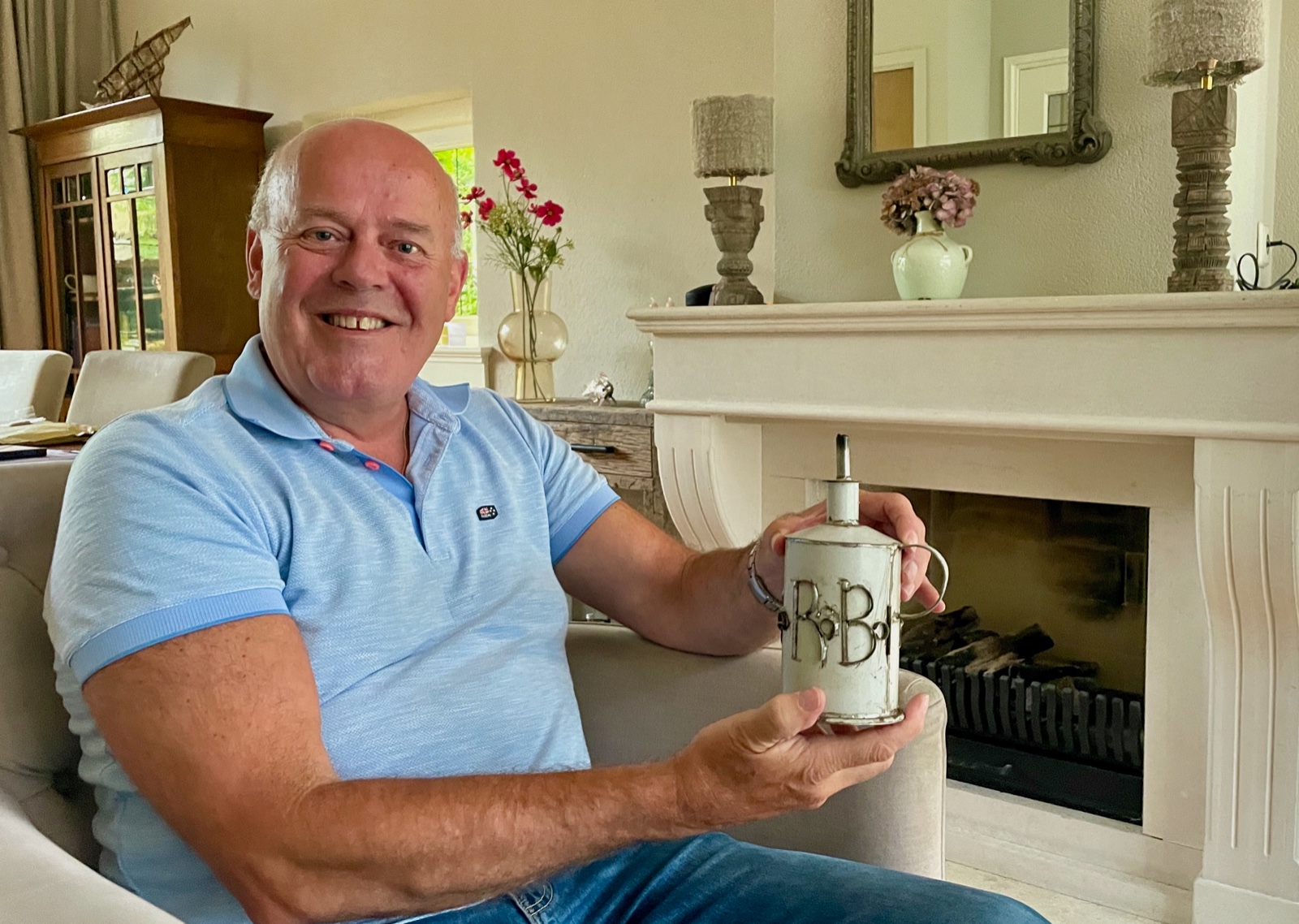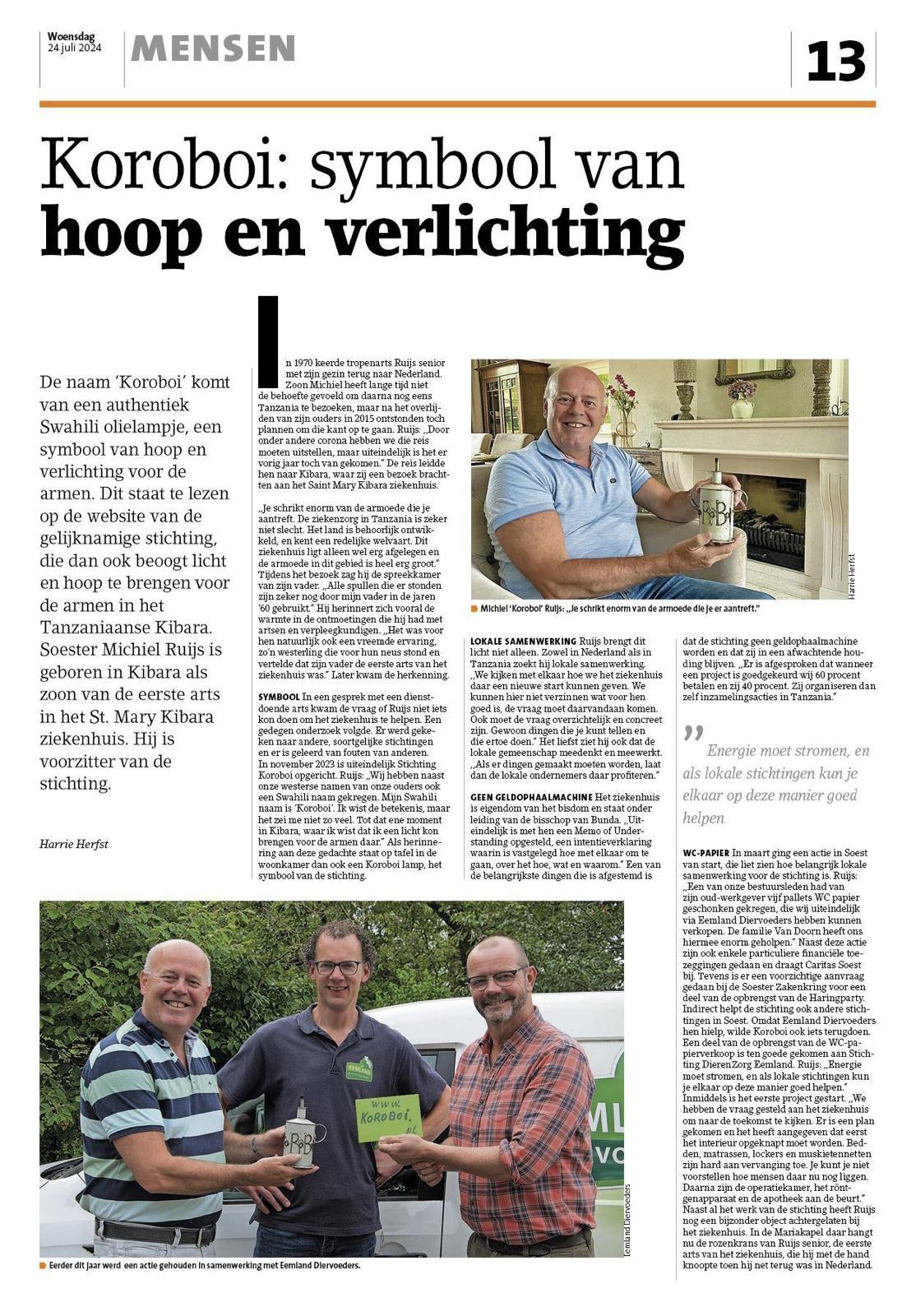Koroboi: Symbol of Hope and Enlightenment
Text: Harrie Herfst
The name 'Koroboi' comes from an authentic Swahili oil lamp, a symbol of hope and relief for the poor. This can be read on the website of the foundation of the same name, which aims to bring light and hope to the poor in Kibara, Tanzania. Soester Michiel Ruijs was born in Kibara as the son of the first doctor at the St. Mary Kibara hospital. He is also chairman of the foundation.
In 1970, tropical doctor Ruijs senior returned to the Netherlands with his family. Son Michiel never felt the need to visit Tanzania again after returning to the Netherlands, but after the death of his parents in 2015, plans arose to go that way. Ruijs: "We had to postpone that trip due to corona, among other things, but in the end it happened last year." The journey eventually led them to Kibara, where they visited the Saint Mary Kibara Hospital. "You are shocked by the poverty you find. The care for the sick in Tanzania is certainly not bad. The country is quite developed, and has a reasonable level of prosperity. However, this hospital is very remote and the poverty in this area is very high."
© Soester Courant
During the visit, he saw his father's old consulting room. "All the stuff that was there was definitely still used by my father in the 60s." He especially remembers the warmth in the meetings he had with doctors and nurses. "Of course, it was also a strange experience for them, such a Westerner standing in front of them and telling them that his father was the first doctor at the hospital." Later, the recognition came.
In a conversation with a doctor on duty, the question arose whether Ruijs could do something to help the hospital. A thorough investigation followed. Other, similar foundations were looked at and lessons were learned from the mistakes of others. In November 2023, the Koroboi Foundation was finally established. Ruijs: "In addition to our Western names, our parents also gave us a Swahili name. My Swahili name is 'Koroboi'. I knew the meaning, but it didn't mean much to me. Until that one moment in Kibara, where I knew I could bring a light to the poor there." As a reminder of this thought, a Koroboi lamp is placed on the table in the living room, the symbol of the foundation.
Ruijs doesn't just bring this light. He seeks local cooperation in both the Netherlands and Tanzania. "Together we are looking at how we can give the hospital there a new start. We can't come up with what's good for them here, the demand has to come from there. The question must also be clear and concrete. Just things that you can count and that matter." Ideally, he would also like to see the local community think along and cooperate. "If things need to be made, let the local entrepreneurs there benefit."
The hospital is owned by the diocese and is headed by the Bishop of Bunda. "In the end, a Memo of Understanding was drawn up with them, a declaration of intent in which it is laid down how to deal with each other, about the how, what and why." One of the most important things that has been agreed upon is that the foundation does not become a fundraising machine and that they remain in a wait-and-see attitude. "It has been agreed that when a project is approved, we pay 60% and they pay 40%. They then organize their own fundraisers in Tanzania."
In March, an action was launched in Soest, which showed how important local cooperation is for the foundation. Ruijs: "One of our board members had received five pallets of toilet paper from his former employer, which we were eventually able to sell through Eemland Animal Feed. The Van Doorn family has helped us enormously with this." In addition to this action, a number of private financial commitments have also been made and Caritas Soest is contributing. A cautious request has also been made to the Soester Business Circle for part of the proceeds of the Herring Party.
Indirectly, the foundation also helps other foundations in Soest. Because Eemland Animal Feed helped them, Koroboi also wanted to give something back. Part of the proceeds from the toilet paper sales went to Stichting DierenZorg Eemland. Ruijs: "Energy has to flow, and as local foundations you can help each other in this way."
The first project has now started. "We asked the hospital to look to the future. A plan has been drawn up and they have indicated that the interior must first be refurbished. Beds, mattresses, lockers and mosquito nets are in desperate need of replacement. You can't imagine how people are still lying there now. Then it's the turn of the operating room, the X-ray machine and the pharmacy."
In addition to all the work of the foundation, Ruijs has left another special object at the hospital. In the Lady Chapel there now hangs the rosary of Ruijs senior, the first doctor of the hospital, which he knotted by hand when he had just returned to the Netherlands.


